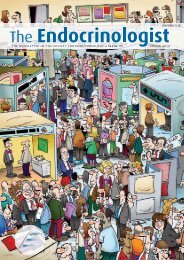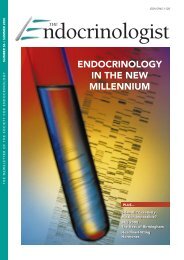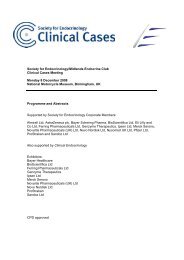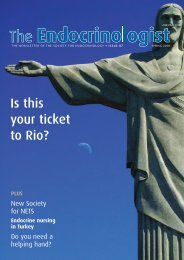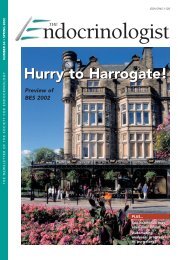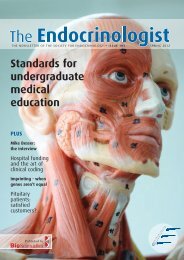Download issue 100 (pdf) - Society for Endocrinology
Download issue 100 (pdf) - Society for Endocrinology
Download issue 100 (pdf) - Society for Endocrinology
Create successful ePaper yourself
Turn your PDF publications into a flip-book with our unique Google optimized e-Paper software.
BRILLIANT BIRMINGHAM: SOCIETY BES 2011<br />
Prader-Willi Syndrome Association UK<br />
The meeting in Birmingham was our second<br />
experience of having a stand at a <strong>Society</strong> <strong>for</strong><br />
<strong>Endocrinology</strong> conference. This was the first time,<br />
though, that we had used our new logo and<br />
banners. The logo - a puzzle piece - symbolises<br />
the complexity of Prader-Willi Syndrome (PWS),<br />
which still has many unanswered questions with<br />
regard to treating some of its aspects.<br />
Caused by missing in<strong>for</strong>mation from several genes<br />
on the paternal chromosome 15, it is usually a de<br />
novo occurrence, although there are hereditary<br />
<strong>for</strong>ms of the syndrome. The hypothalamus is<br />
affected and this in turn leads to dysfunction in several<br />
areas, notably appetite, growth, sexual and emotional<br />
development, and sleep disorders. In addition, the obesity<br />
caused by a combination of hyperphagia and hypotonia,<br />
means that around a quarter of adults with PWS develop<br />
Type 2 diabetes. A minority also have hypothyroid<br />
problems. The majority have learning disabilities and<br />
varying degrees of challenging behaviour.<br />
Whilst growth hormone treatment is helping many of<br />
today's generation of children attain a normal height and<br />
increased muscle mass, sex hormone treatment is still not<br />
routinely prescribed <strong>for</strong> men and women with PWS, and the<br />
hyperphagia is still not fully understand. A person with PWS<br />
will continue to feel hungry even after a very large meal;<br />
currently, the only way to manage this is by controlling the<br />
food environment and providing lower calorie meals.<br />
Endocrinologists-in-training<br />
Once again the Young Endocrinologists’ quiz night proved<br />
to be a popular and successful event. With great food and<br />
free libation, the <strong>for</strong>um provided a superb opportunity <strong>for</strong><br />
the Young Endocrinologists (YEs) to network and meet<br />
senior members of the <strong>Society</strong>. Teams were captained by<br />
Steve Orme, Saffron Whitehead, Waljit Dhillo, Alan<br />
McNeilly, John Bevan, and Julian Davis, to name but a few!<br />
This year’s quiz included the popular endocrine celebrities<br />
round and a new music round in the style of Name that<br />
tune! A fiercely competitive re-mark produced the winning<br />
team: The Northern Misfits captained by Steve Orme (team<br />
members included Helen Prescott, Hassan Kahal, Luke Teo,<br />
Gill Cooper, and Ka Ying Ng). Second place went to<br />
Bloom’s Bacardi Breezers, and joint third place to North<br />
Meets West and Calorie Burners! Prizes were kindly<br />
awarded to the two winning teams courtesy of the <strong>Society</strong>.<br />
A study day <strong>for</strong> nurses caring <strong>for</strong> adult endocrine patients<br />
13 July 2011, St George’s NHS Healthcare Trust, London<br />
‘<strong>Endocrinology</strong> <strong>for</strong> Nurses: Common conditions seen in endocrine clinics’<br />
Topics include: acromegaly, endocrine biochemistry,<br />
growth hormone replacement and hyperthyroidism.<br />
Please contact Fiona Anthonypillai (fiona.anthonypillai@stgeorges.nhs.uk)<br />
12 T H E E N D O C R I N O L O G I S T • I S S U E 1 0 0 • S U M M E R 2 0 1 1<br />
The PWSA UK is a national charity with 30 years'<br />
experience in supporting families and people with PWS.<br />
We have a wide range of in<strong>for</strong>mation about all aspects of<br />
the syndrome. Our latest publication "What is PWS? How<br />
can we help?" was made possible with a grant from the<br />
<strong>Society</strong> <strong>for</strong> <strong>Endocrinology</strong>.<br />
Because PWS typically will involve a number of medical<br />
specialities including dietitians, orthopaedic specialists,<br />
psychiatrists, speech therapists, and endocrinologists, the<br />
PWSA UK is keen to support the setting up of<br />
multidisciplinary clinics - five now operate throughout the<br />
UK. For children, these are in Glasgow, Birmingham,<br />
Brighton and Chelsea & Westminster, with another at<br />
Hammersmith Hospital <strong>for</strong> adults. The PWSA UK sends a<br />
staff member to the clinics to offer pastoral support and<br />
non-medical advice. In<strong>for</strong>mation about these clinics was<br />
available on our stand and we are always happy to talk to<br />
other clinicians who may wish to consider a similar initiative.<br />
It was not entirely surprising to us that amongst the<br />
multitude of posters at the conference, not one was<br />
about Prader-Willi syndrome. It is a rare syndrome,<br />
affecting around 1 in 22 000 live births, and hence it is<br />
not always easy to access patients with PWS to carry out<br />
research. However the complexity of the syndrome makes<br />
it a very interesting subject which involves many areas of<br />
endocrinology. The PWSA UK is in touch with over 800<br />
families and can help to find subjects <strong>for</strong> research, as well<br />
as supporting research as part of our charitable aims.<br />
JACKIE WATERS, Director Of Services, PWSA (UK), www.pwsa.co.uk<br />
This year’s YE symposium was on ‘A Successful Research<br />
Career’. Attendance was very good. The first session was<br />
by Dr Miguel Debono, who outlined routes to a research<br />
career in clinical academia. Professor McNeilly then gave<br />
a candid overview of how to manage your research<br />
degree, in particular highlighting the difficulties of<br />
further career progression. Dr Hanaloglu then gave a talk<br />
‘The things I wish I knew’. She gave a personal overview<br />
of her experience, both ups and downs, as a post-doc<br />
and her progression to becoming a principal investigator.<br />
Finally, Dr Webster gave us a taste of how to translate<br />
and protect successful scientific research through<br />
commercialisation and patents.<br />
The Young Endocrinologists’ Prize Lecture session was a<br />
fantastic demonstration of the great ability of our<br />
trainees and we congratulate both Dr Matthews (basic<br />
science) and Dr Chahal (clinical) <strong>for</strong> their superb lectures.<br />
Finally, the conference dinner was very well attended by<br />
the YEs and it just remains <strong>for</strong> me, as outgoing YE Chair, to<br />
thank the YE Steering Group (Victoria Sharp, Louise Lloyd,<br />
Abd Tahrani and Jo George), and the <strong>Society</strong> <strong>for</strong> all their<br />
support and to welcome the incoming Chair Victoria Sharp.<br />
ALIA MUNIR


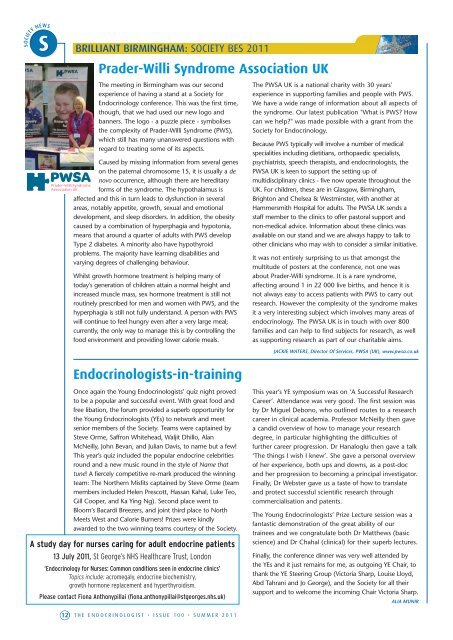
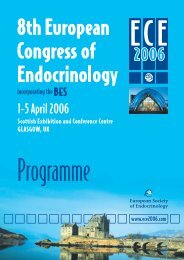
![The Endocrinologist | Issue 99 [PDF] - Society for Endocrinology](https://img.yumpu.com/48213777/1/184x260/the-endocrinologist-issue-99-pdf-society-for-endocrinology.jpg?quality=85)
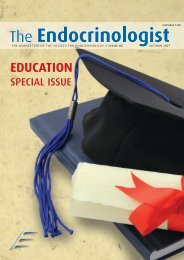
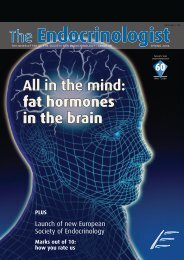
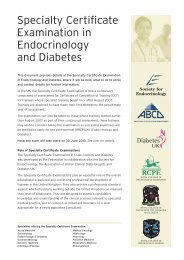
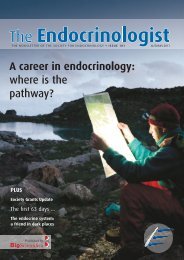
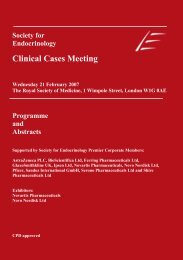
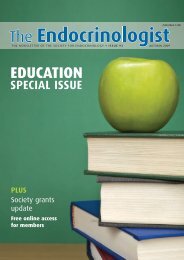
![The Endocrinologist | Issue 97 [PDF] - Society for Endocrinology](https://img.yumpu.com/40840065/1/184x260/the-endocrinologist-issue-97-pdf-society-for-endocrinology.jpg?quality=85)
